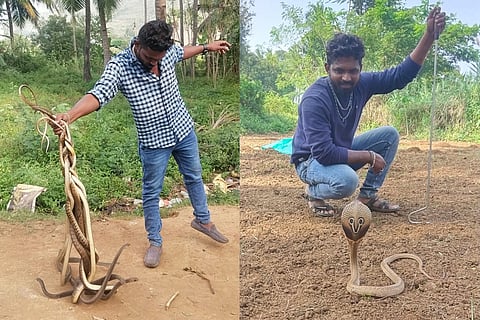

TIRUPATTUR: When B Ashok Kumar encountered a snake for the first time 13 years ago, it was an unusually pleasant experience. Unlike many other youngsters, he was neither scared nor being sceptical despite the scared reptile hissing and attacking him.
“I was 17, talking to my friends near a stream when we saw a snake glistening in the sun. As their reflexes kicked in, my friends began hitting the snake. Instinctively, I tried to rescue the snake from them, but it bit me,” says Ashok, now 30.
The teenager was rushed to the hospital, and a blood test was done to check for the presence of venom. Thankfully for him, the snake was non-venomous, and its bite had no adverse effect. However, the first blood was drawn, and the locals decided that the snake should pay for its deeds with its life. “I felt guilty when I found out that the snake was killed. It was sad that even though it caused me no harm, people assumed it to be dangerous and killed it. This happens with most snakes, venomous or non-venomous,” recalls Ashok.
Hailing from Natarajapuram, a village near the Ambur reserve forest in Tirupattur district, Ashok’s fascination for wildlife began as a child. “I once witnessed a rescue operation and the subsequent confinement of an elephant near the reserve forest. That sparked my curiosity. Throughout my childhood, I frequently encountered such incidents while on my way to school,” he reminisces.
While most people would avoid snakes, particularly after being bit by one, Ashok says he developed a fondness for cold-blooded reptiles. “After that incident, I became curious about their lives. I read books related to snakes and other reptiles as well as animals and soon started getting involved in rescue activities. I used to work as a painter before I got a job at a private factory,” he says.
Now a volunteer with the Tamil Nadu Fire and Rescue Services, Ashok recalls a distressing call he once received from a woman who was panicking as a snake had entered her house. “The woman was worried as she was at home with her child. I immediately paused my work at the factory and rushed to rescue the snake. Snakes are often sighted in cramped spaces such as huts and sheds, where they seek shelter and hunt for rats and other prey,” he shares.
Contrary to the popular belief that all snakes are dangerous, there are only four most common venomous snakes in India — the spectacled cobra, the Russell’s viper, the common krait and the saw-scaled viper — known as the big fours.
“People often mistake non-venomous snakes as venomous, which leads to fatal consequences for the snake. Venom and poison are defence mechanisms for the snakes, which they inject using their fangs. People must understand that as long as we refrain from disturbing the snakes, they mean no harm to us,” Ashok points out.
When a snake enters a house or any other private or public place, one must immediately notify snake rescuers, forest officials or the rescue services. Till their arrival, one must monitor the reptile’s movements without causing any disturbance, says the seasoned rescuer, who has captured between 6,000 and 8,000 snakes in the past 13 years.
While his primary focus is on rescuing snakes, Ashok has also rescued monitor lizards, monkeys, birds and other animals, sometimes with the help of forest department officials, before releasing them.
“At the end of the day, we must remember that they too are living beings,” says Ashok, before signing off.
Not all snakes are dangerous
Contrary to the popular belief that all snakes are dangerous, there are only four most common venomous snakes in India — the spectacled cobra, the Russell’s viper, the common krait and the saw-scaled viper — known as the big fours, says Ashok Kumar
(Edited by Srijith R)